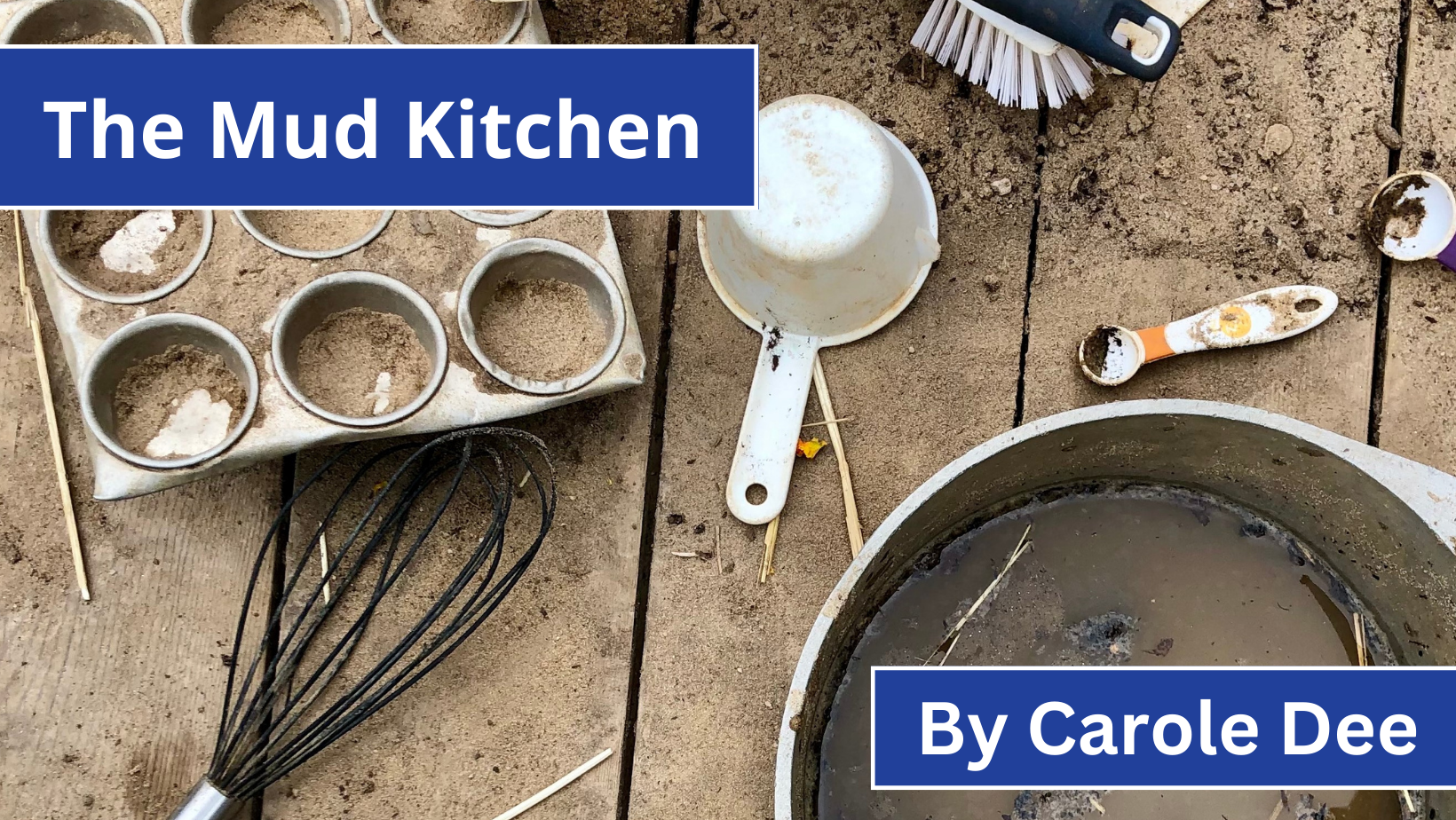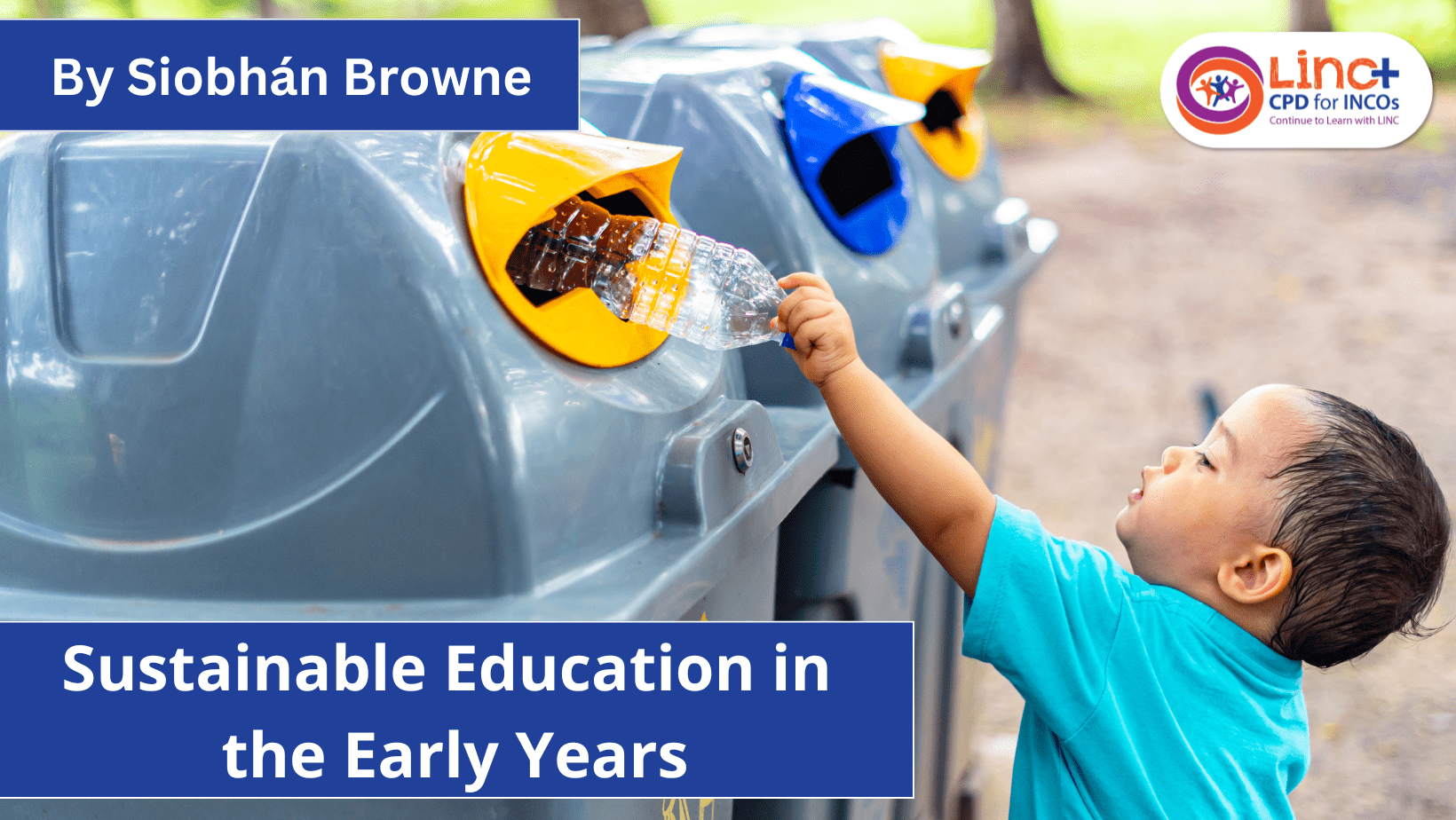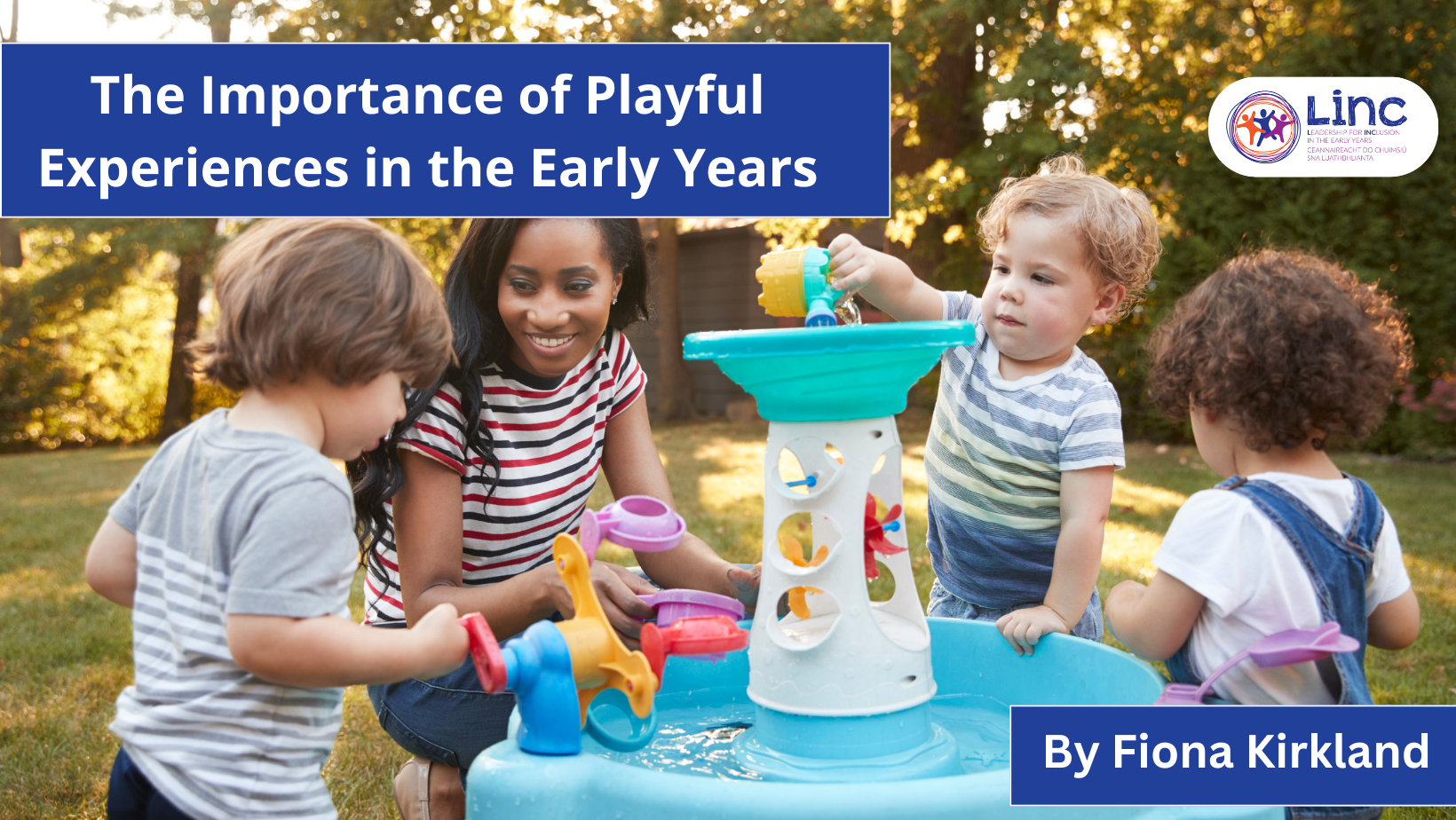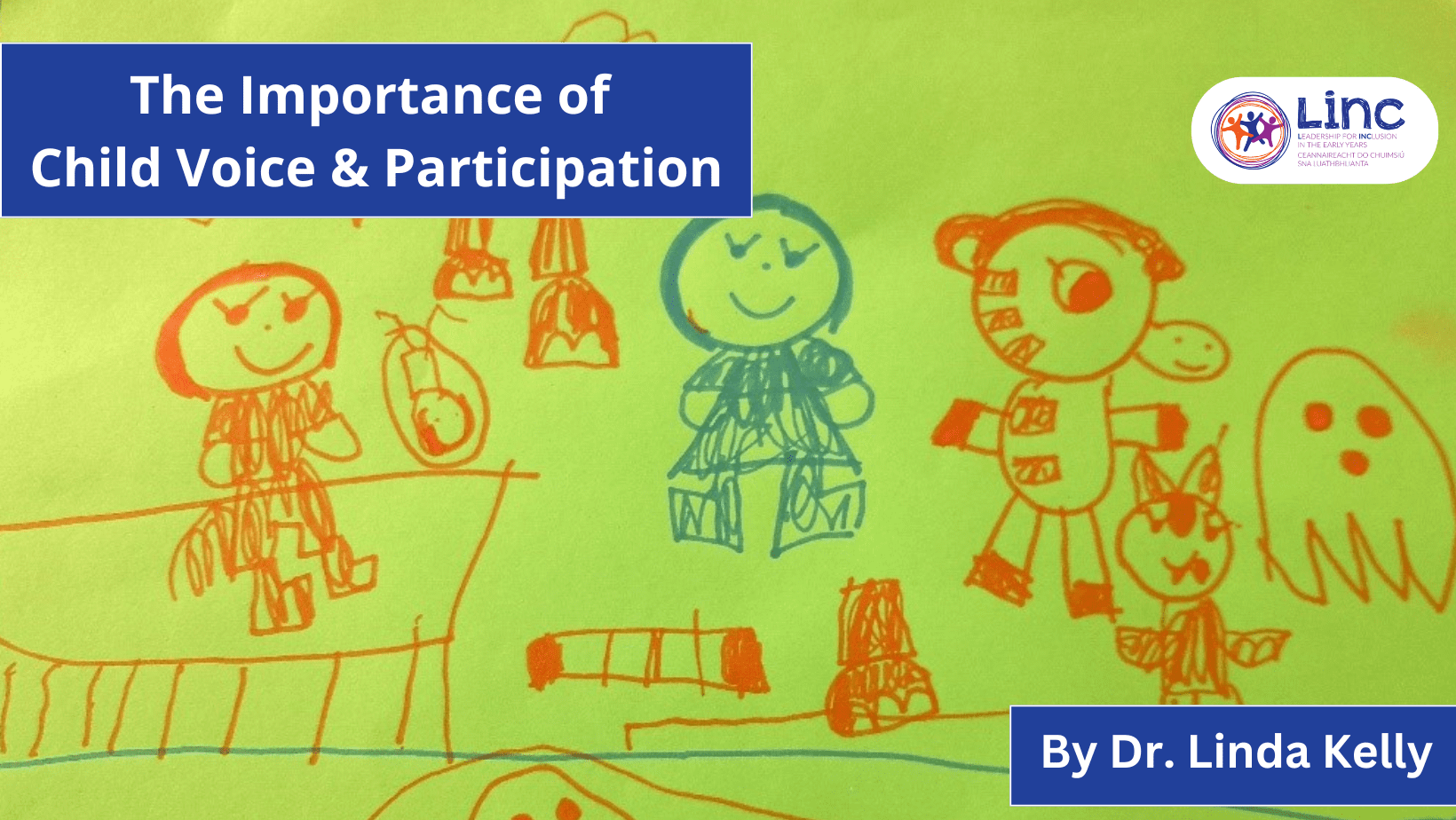The Mud Kitchen
In this edition of the LINC Blog, LINC Tutor Carole Dee describes how her Setting’s Mud Kitchen encourages children’s social and emotional development and provides endless opportunities for open ended, sensory play.

The Mud Kitchen is without doubt the most popular play area in our outdoor environment! It is always occupied, always messy and so beneficial for all who play in it! The mud kitchen provides a fun form of messy, sensory play that inspires creativity and promotes peer interactions. An array of real cooking and baking utensils inspires lots of baking, cooking and soup making!
The mud kitchen provides endless opportunities for open ended, sensory play. The focus should be all about the process of open-ended imaginative play rather than an end product. Natural and open-ended loose parts can be added to the materials and rotated each season to inspire curiosity, imagination, symbolism, creativity and language skills.


Many friendships are developed while cooking a pot of “soup” or washing the dishes together!
Play with mud and other natural resources provides children with many opportunities to connect and interact with nature and the world around them. Playing in and with mud can be a joyful experience which stimulates the immune system and increases serotonin levels in the brain. This endorphin release helps us to feel relaxed, calm and soothed. There is much research to show that regular exposure to mud creates a more robust immune system that is less prone to allergies (Moser 2020; Rupiper 2016).
Providing children with opportunities to mix “potions” or “cook” and serve their culinary delights in bowls, empty yoghurt pots or cups will result in high levels of involvement, social interaction and well-being!
Equipment for the mud kitchen can be collected over time. Involve parents by asking them to donate any old or unused pots, pans, an old kettle, toaster or kitchen utensils. Visit local charity shops for suitable kitchen ware, particularly stainless-steel items as they will last for years! There are plenty of discount stores that sell ideal kitchenware very cheaply, making equipment for your mud kitchen very affordable.

A Pewter Teapot and 4 goblets were an exciting find in a local charity shop!

Colourful flowers are grown in the garden for children to pick and create with. This child is creating a “Flower Petal Potion!”

A weekend walk by one family resulted in a haul of acorns! This child was so proud to bring these in to share with her friends. An opportunity for language development arose as we discussed Irish native trees, the fruits and nuts they bear and an interest in squirrels then emerged!

Some children just love mixing, pouring and the open-ended, sensory process of mud kitchen play while others get very creative and design their dishes with precision!

Herbs are grown in pots and easy to access for little hands. These are easily and cheaply replaced if they are picked bare!
A donation of wood slices from a neighbouring preschool is added to the loose parts. The result: “Pizza” slices served with a garnish of freshly picked grass! A Mud pie pancake on the side for dessert!

Children are happy to use any vessels available to them and become quite resourceful in discovering items from other play areas that work for them in the mud kitchen! This tin can was a pencil holder in the mark making area (the first sign of rust and this will have to be disposed of).


A mud kitchen does not have to be fancy, expensive or intricate. A couple of basins or large buckets using soil, compost or sand with water for mixing, along with a selection of kitchen utensils or sticks and spades and empty recyclable containers is all that is needed to get you started!
My experience of facilitating mud kitchen play has been one that it supports the inclusion of all children. Children with sensory differiences can be invited to engage very small amounts and small utensils so that they don’t have to touch the mud, but can gradually come to enjoy it on their own terms and at their own pace and this may start with merely observing others at play or a supportive adult modelling for them.
There are no photos showing the “design” of our settings mud kitchen, because how it looks is not important; the richness of the play that takes place within it, is what really matters and benefits all children immensely in every area of their development! In the words of pioneer Margaret McMillan (1925), remember that “The best classroom and the richest cupboard is roofed only by the sky”

Carole Dee
Reference List:
McMillan, M. (1925), Nursery Schools and the Pre-school Child, NSA Publication.
Moser, H. ( 2020) Why playing in the mud is more than just fun, available: https://natureplayqld.org.au/blog/why-playing-in-the-mud-is-more-than-just-fun#:~:text=MUD%20PLAY%20CAN%20REDUCE%20CHILDHOOD,anxiety%20and%20stress%20in%20children [accessed 08th February 2023].
Rupiper, M. (2016) Mud, Marvelous Mud, available: https://www.communityplaythings.com/resources/articles/the-benefits-of-mud-play {accessed 08th February 2023].
Useful Resources:
Willoughby, M. (2014), Outdoor Play Matters, Barnardos: Dublin, available: https://knowledge.barnardos.ie/bitstream/handle/20.500.13085/238/par_outdoor_play_2014_0196.pdf?sequence=1&isAllowed=y [accessed 08th February 2023].
You may also like:

Sustainable Education In The Early Years
Sustainable Education in the Early Years In this edition of the LINC Blog, Siobhán Browne, LINC+ CPD Programme Participant and Manager at Jigsaw Day Nursery, discusses how she incorporates sustainable education into daily practices at her setting. She explains how...

The Importance of Playful Experiences in the Early Years
The Importance of Playful Experiences in the Early Years In this edition of the LINC Blog, Fiona Kirkland, Play Pedagogy Officer at Play Scotland, emphasises the transformative impact of play on early childhood development. Drawing from her extensive...

Children Should be Seen and Heard: The Importance of Child Voice and Participation
Children Should be Seen and Heard : The Importance of Child Voice and Participation In this edition of the LINC Blog, Dr. Linda Kelly explores the critical importance of child voice and participation in early childhood settings. Highlighting key insights from...
